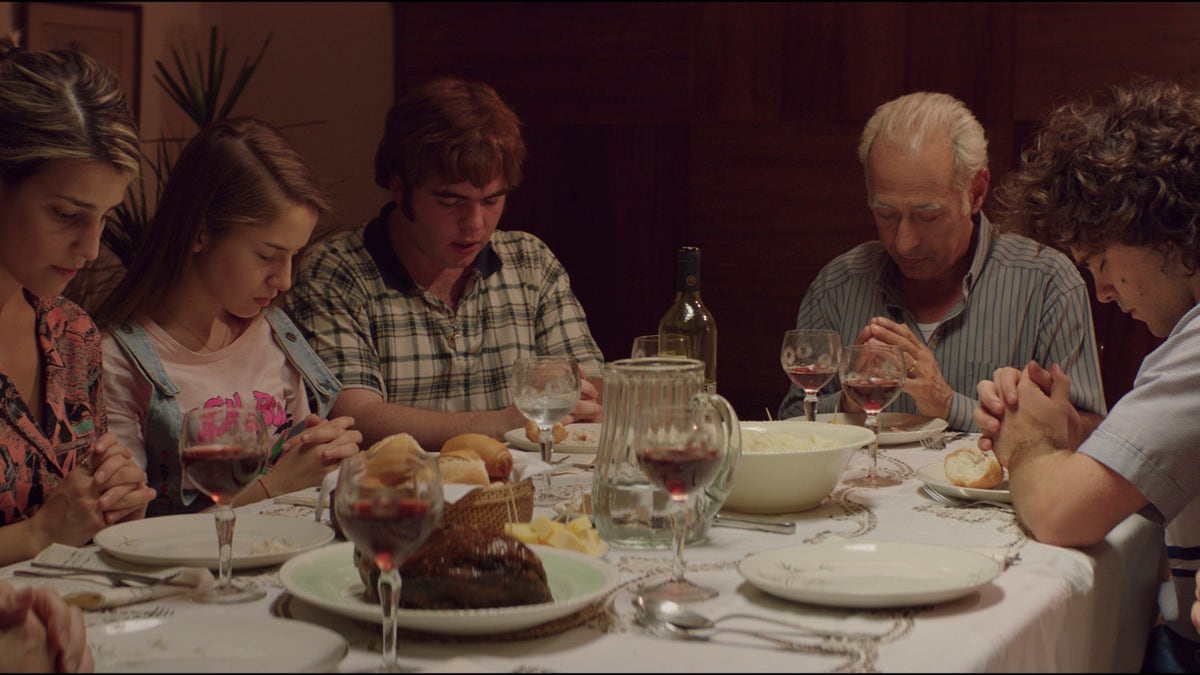
In this undated film frame released by K&S Films, actors playing the members of Puccio pray before dinner during the film The Clan by Argentine filmmaker Pablo Trapero. Over the course of about three years, members of the family killed at least three people they had kidnapped for ransom. A fourth victim was freed after being held in chains in a basement cell of the Puccio home. (K&S Films via AP)
BUENOS AIRES, Argentina (AP) – Arquimides Puccio seemed to neighbors like a pious, conservative and obsessively tidy man. Several times a day, he'd sweep the sidewalk in front of his home in an upper-class Buenos Aires neighborhood.
Cleanliness was not his only aim. Puccio was making sure that the screams of kidnap victims imprisoned in the basement of his home could not be heard in the street.
That mundane mask over horror is a key theme of "The Clan," a movie based on a true story that rattled Argentine society in the 1980s.
The well-reviewed film, directed by Argentine Pablo Trapero, has had the most successful launch of any Argentine film. It's headed for film festivals in Venice, Toronto and San Sebastian, followed by release later in Europe and possibly the United States.
Over the course of about three years, members of the family killed at least three people they had kidnapped for ransom. A fourth victim was freed after being held in chains in a basement cell of the Puccio home.
"It's a story I wanted to tell for a long time. I got hooked when I was a kid and the family was arrested," Trapero told The Associated Press. "What I remember most is that the victims in the house were friends of the (Puccio) family."
The film shows the seemingly normal, church-going family interacting with victims-to-be. One of those killed played in a rugby league with Puccio's son Alejandro.
"The perversion of that family shakes you up," said Javier Solano, a 27-year-old who had just seen the film. "They are sitting at the table eating as if nothing was going on while they have a woman locked in the basement who doesn't stop screaming."
Police investigating the kidnapping of 58-year-old Nelida Bollini finally tracked the family down with the help of tapped telephones.
Behind a moveable closet in the closet was a small, filthy, windowless room where prisoners were kept chained. The Puccios used fans to blow a breeze over chunks of wet grass to make prisoners believe they were in the country. A can with a piece of wood functioned as a bathroom.
Arquimedes Puccio and his sons Alejandro and Daniel were sentenced to prison, as were a former colonel, a bodyguard and another accomplice.
Alejandro tried to kill himself four times while imprisoned and died of pneumonia shortly after being released from prison in 2007.
Daniel escaped in 1988 and never served prison time.
Officials never determined what happened to the estimated $1 million in ransoms the family received.
The patriarch of the clan was imprisoned, freed on a technicality and then put behind bars again. He was released on probation in 2007, moved to a provincial town and died in 2013 at the age of 82, without ever acknowledging the crimes.
Neighbors said that almost to the end, Puccio swept the sidewalk in front of his home.
The film is part of a wave of renewed attention to the Puccio case on the 30th anniversary of the police raid that captured the family.
A local television station is launching a miniseries focused on it and books and newspaper articles about the case abound.
The interest comes at a time when Argentina is still learning details of the crimes of a 1976-1983 military dictatorship in which thousands of suspected leftists were seized, tortured and secretly killed.
After democracy returned, the country saw a wave of kidnappings blamed on former soldiers and police who had turned from seizing dissidents for the state to kidnapping businessmen for ransom.
Puccio himself had been an army sergeant who joined a secretive, government-backed far-right death squad in the 1970s.
The sense of hidden horrors reverberates with Argentines today, Trapero said. The country has been riveted by the mysterious death of a prosecutor who had accused the president of covering up a terror bombing. And a scandal over the country's spy agency has revealed that some agents from the dictatorship era are still linked to the intelligence services.
"Something that we talked about in the 1980s has ended up touching on the present," Trapero said.






